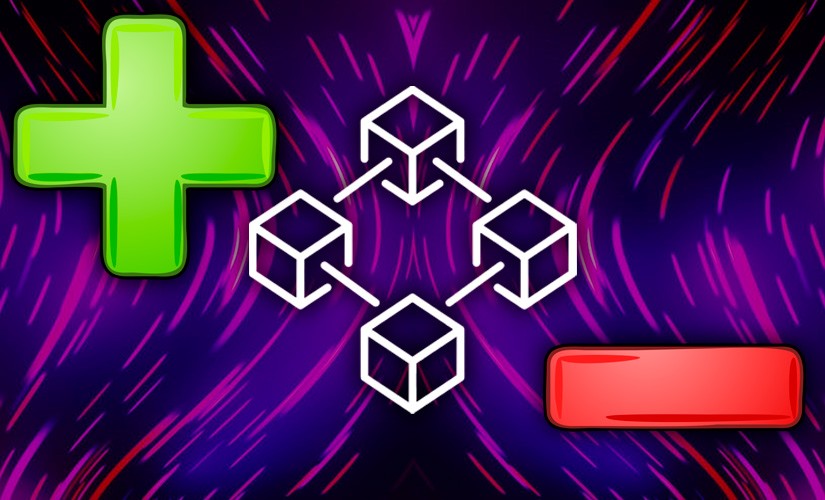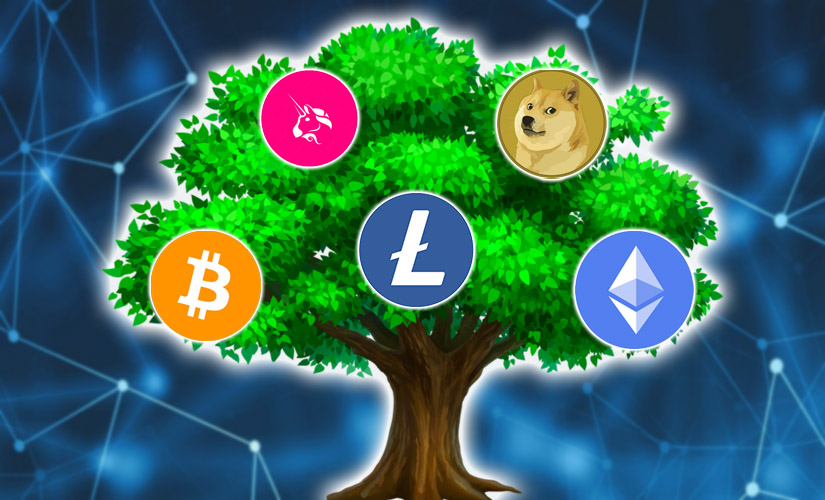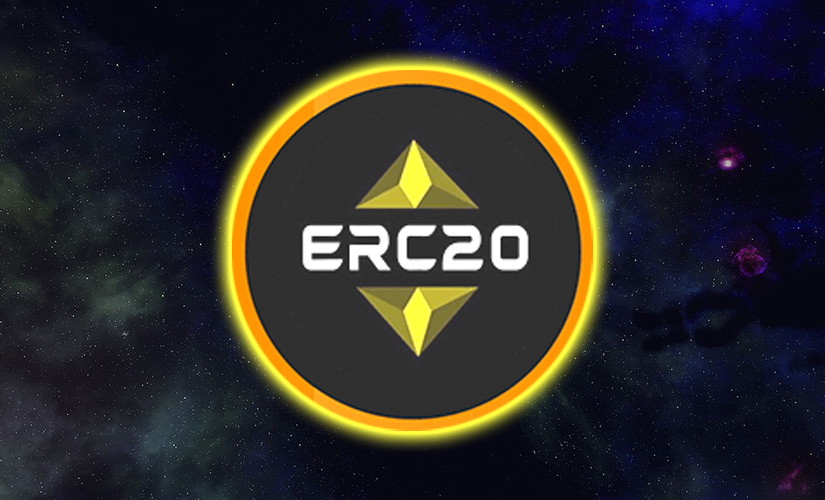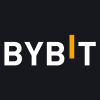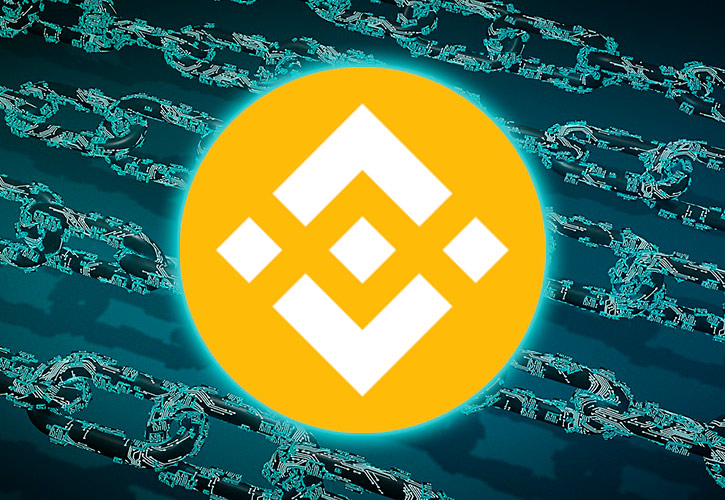
In 2019, the team of the largest cryptocurrency exchange launched the native Binance Smart Chain. After DeFi’s surge in popularity in 2021, the developers realized that the network needed to be upgraded. They created a parallel Binance Smart Chain with support for smart contracts. To quickly launch new tokens, the BEP20 protocol was written. It is based on the Ethereum code, but runs on the Binance Smart Chain blockchain. This ensures compatibility with Ethereum. Network participants can deploy smart contracts quickly and cheaply. The throughput of the BEP20 network is dozens of times higher than that of Etherium. The commission is less than $0.01.
What smart contract means
First, programmers prescribe all the nuances of the transaction in the code and sanctions for their violation. Once launched, the smart contract independently monitors the fulfillment of conditions. It can transfer blocked coins or impose a fine.
If the algorithm needs information from the outside world, it uses oracles. These intermediary programs transfer data to and from the blockchain securely. With the help of oracles, a smart contract can determine the exchange rate of fiat and cryptocurrencies, and the status of a payment.
Programmers prescribe in the code the full terms of the transaction or part of them. In the second case, the program is supplemented by a paper document. The most popular option is that the smart contract regulates settlements, and the procedure for dispute resolution is contained in a cover letter.
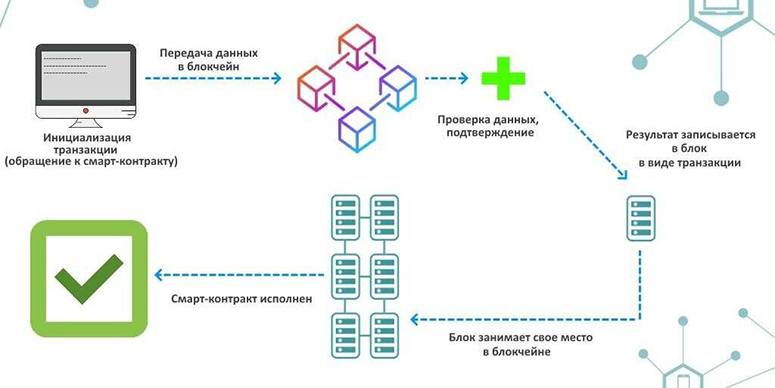
What is the BEP20 network
The smart contract standard is a set of rules by which you can create your own cryptoassets. The most popular are ERC tokens that work on the Etherium blockchain. To create dApps and make it easy to use coins in DeFi, Binance Chain developers have launched a parallel BSC chain. It runs on EVM (Etherium Virtual Machine) and allows creating Ethereum-compatible applications.
The BEP20 protocol is an improved analog of ERC-20. They are virtually identical. The BSC blockchain has more bandwidth and lower fees. Due to compatibility, dApps developers create projects on BSC and port them to Ethereum. In the Binance Smart Chain test chain, you can debug algorithms for free.
5020 $
bonus for new users!
ByBit provides convenient and safe conditions for cryptocurrency trading, offers low commissions, high level of liquidity and modern tools for market analysis. It supports spot and leveraged trading, and helps beginners and professional traders with an intuitive interface and tutorials.
Earn a 100 $ bonus
for new users!
The largest crypto exchange where you can quickly and safely start your journey in the world of cryptocurrencies. The platform offers hundreds of popular assets, low commissions and advanced tools for trading and investing. Easy registration, high speed of transactions and reliable protection of funds make Binance a great choice for traders of any level!
To deploy smart contracts, the team has created its own standard – BEP-20. With its help, network participants can quickly issue tokens and promote projects. The developers of dApps raise initial funding at closed sales.
Features
BEP-20 cryptocurrencies can be created according to the template by any user who knows the basics of programming. Unlike coins on proprietary blockchains, the tokens do not need large funding and a development team to launch. These assets have the following features:
- Fast and cheap transfers. The block creation time is 3 seconds. A small fee (less than $0.01) is charged per transaction.
- Function in a growing ecosystem with millions of participants.
- Supported by the largest exchange Binance.
- Cross-chain mechanism extends the functionality of assets.
Differences of BEP20 from BEP2 and ERC20
The introduction of standards has simplified the issuance of new cryptocurrencies. Developers don’t need to write a blockchain from scratch. The infrastructure of a popular blockchain can be used. Standard assets can be easily exchanged for native network coins.
ERC-20 is a set of rules for smart contracts in Ethereum. BEP-2 is the technical protocol for running assets on the Binance Smart Chain. It does not support smart contracts. After the development of the parallel chain, the BEP-20 standard was adopted. It is not technologically different from ERC-20, only works in BSC.
What tokens can be in the BEP20 network
The BSC network became popular in 2021 on the background of high Ethereum fees (during the market peak, fees in Etherium reached $100). It can be used for:
- Coins issued on the BC chain.
- BEP-20 tokens.
- Top assets issued in other networks (Bitcoin, Ethereum, Tether). They can be transferred through the BEP20 network and save on fees. For example, transferring bitcoin will cost $3-4 cheaper.
What are pegged tokens
This is a type of asset whose price depends on the value of the original cryptocurrencies. In the Binance Smart Chain, tokenized BTC, ETH, USDC, USDT and other coins are available. They are used for trading on ecosystem DEX, cheap transfers, earning on lending platforms, and pharming liquidity.
In the BSCscan browser, you can see a list of tokenized assets with contract addresses, number of holders and capitalization.
List of popular wallets
With the development of DeFi, the issue of secure storage of BEP-20 tokens becomes relevant. Non-custodial wallets are considered the most secure. They transfer private keys to users, so outsiders (including developers) can not get access to coins.
JavaScript support is required to connect to Web3. Therefore, desktop wallets are not suitable.
BEP20 network users choose mobile, online and hardware vaults. They can safely hold coins, connect to DEX for trading and additional earnings.
Hardware
For storing assets, you can use portable devices, outwardly resembling a flash drive. The software of hardware wallets is different from other platforms, so hackers cannot infect it with viruses. Private keys are in a detached environment without access to the internet. Such wallets are considered the most secure. They can also be hacked, but for this you need to gain access to the device. The standard is supported in the following popular wallets:
Mobile
Cryptocurrency prices change frequently. Active traders and investors have a need for quick access to them. Mobile wallets provide high reliability of coin storage and convenience. Users can transfer and exchange assets via smartphones anywhere.
The private keys of mobile vaults do not leave the devices. Biometric login can be added for additional security.
In 2023, multi-currency vaults will support the BEP-20 standard. In addition to Binance Smart Chain tokens, they can hold the assets of several dozen chains and NFTs. Most applications have built-in exchangers. This is convenient, but you will have to pay a transaction fee of up to 5%. The following wallets are popular in 2023:
Online
Such storages are considered less secure due to constant access to the network. According to statistics, the most common cause of asset loss is irresponsible key storage. Only services in the form of plugins have access to Web3. In 2023 are popular:
How to withdraw tokens
Coins can be sent to an exchange or wallet, exchanged for other assets. Before confirming the transaction, it is necessary to carefully check the network. In the case of an error, it will not be possible to return the funds. The instructions for withdrawal are as follows:
- Get a wallet address on a third-party platform.
- Enter the interface and select the coin BEP-20.
- Enter the address of the recipient.
- Specify the volume.
- Click on the Send button.
- Sign the transaction.
Create a test token
The BEP-20 standard appeared in 2021 and quickly gained popularity. Despite the prominence of ERC-20, users appreciated the new features of the BSC protocol:
- Transaction processing speed of 30-40 TPS.
- Transaction fees of less than $0.01.
- To exchange a token for BNB, it is enough to connect the wallet to DEX and enter the contract address in the corresponding field.
- Ethereum compatibility. It allows you to easily transfer dApps between networks.
- The smart contract can be verified in a test chain before launching.
Who may need it
Tokens are launched by entrepreneurs who create new DeFi projects. Developers publish a White Paper, a presentation of the idea and distribute the cryptocurrency to users. This is how to get initial funding and develop the project. If the dApp shoots out, the developers and the first investors can earn good money.
Also, BEP-20 assets are popular among businessmen who want to ensure the reliability of the transaction. It is enough to write all the conditions in the code, issue a coin (they can be linked to fiat or top cryptocurrencies) and deploy the algorithm.
Top-up and commissions
To perform transactions in the Binance Smart Chain blockchain, you need to have some BNB in your account. Coins can be transferred from an exchange or other interface. You need to pay a fee for creating a BEP-20. In June 2023, it is $3.5.
To work in the test network, you can request free coins. To do this, you need to go to the BSC faucet website and insert your wallet address. The account will be replenished by 1 BNB. The operation can be performed not more than once a day.
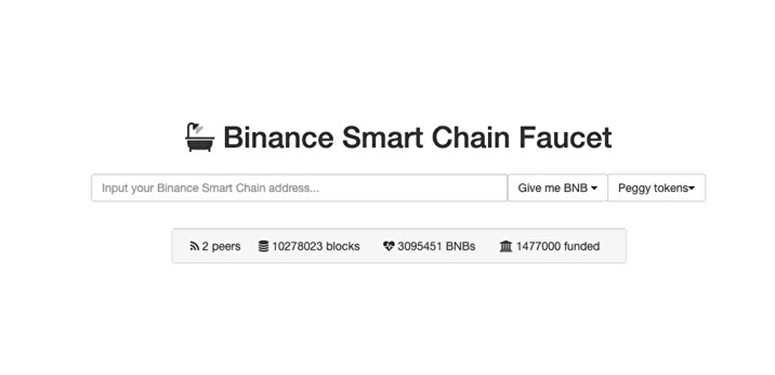
Creating a wallet and connecting to the network
It is more convenient to use the browser plugin. Installation instructions:
- Go to the site of the storage, click on the Download button and choose a browser.
- The application page in the store will open. You need to confirm the download. Installation of the plugin is automatic.
- Create an account. You need to think up a password and write down the Seed-phrase.
- To confirm, enter a few words from the mnemonics. A notification about creating a wallet will appear on the screen.
By default, users are connected to the Ethereum (or BSC) network. It will be necessary to change the chain to a test chain. To do this, click on the name of the network at the top of the screen and select BSC Testnet.
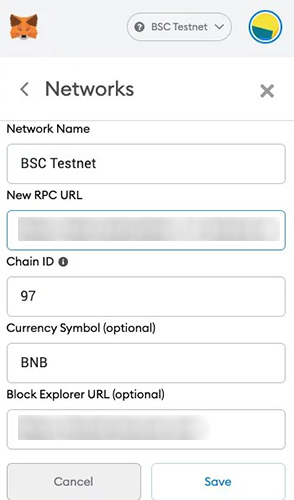
If it is not in the list, you should click on the Add button. Next, you will need to fill out the form by specifying:
- Name.
- RPC URL.
- Currency Symbol.
- BNB block explorer URL.
Writing a smart contract program
To create a cryptocurrency, you need to put a set of functions into the code. When using the BEP-20 standard, the process is simplified. The algorithm should contain standard options:
- TotalSupply() – maximum offer.
- BalanceOf(account) – display the account balance.
- TransferFrom(sender, recipient, amount) – crypto transfer between users.
- Transfer(recipient, amount) – sending coins.
- Allowance(owner, sender) – maximum amount of cryptocurrency that can be sent.
- Approve(sender, amount), transfer(sender, recipient, value), approve(sender, amount) – proof of spend.
Contracts are written in the Solidity language. Ready templates for coding functions are available on theme blogs. When calling options with Write status (blockchain modification), a fee is charged.
Compilation and deployment of the token
To run a smart contract, you need to get the code. For this purpose, it is necessary to compile it. The operation is performed in the Remix environment. It is accessible from the Web browser. The instructions are as follows:
- Create a new workspace.
- Think of a name.
- Open a new file with .sol extension and add code.
- Start compilation.
To start the BEP-20 operation, you need to open the smart contract deployment page. It is necessary to confirm the operation. After that, the coin will start working, and the user will see the data on the screen about finding the first block.
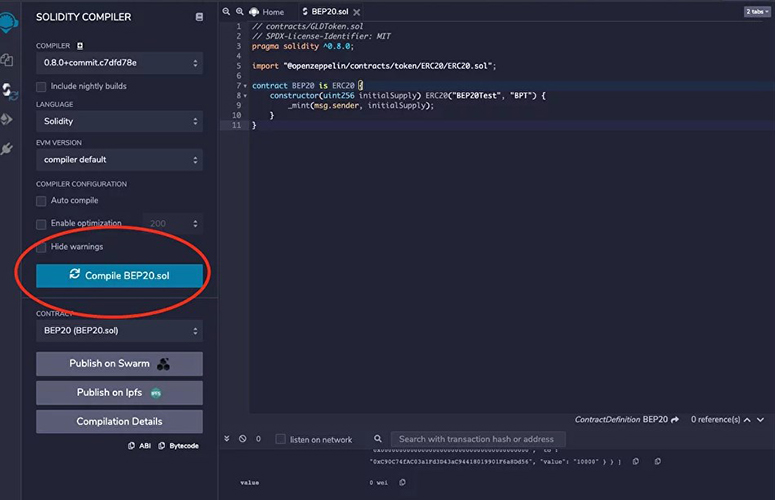
Publishing a smart contract
After the token is deployed, it is necessary to go to the BEP20 network browser, select the test chain and enter the identifier. The screen will display all the data for the asset. You need to copy the contract address. You will need it to add the asset to your wallet. Next, you need to publish the smart contract:
- Go to the Contract tab in the block browser.
- Click on the Verify button.
- Enter the program code and confirm the action.
After a few minutes, a message about the completion of the operation will appear. To verify you need to:
- Open the wallet and add a token. Click Add token, enter the ticker and contract address.
- Create another account and repeat the operation from point 1.
- Transfer some coins from one address to another.
If everything is done correctly, the transaction will appear in the block browser. You can transfer new tokens and exchange them for BNB.
How to promote the project
To earn money, you need to make as many people as possible aware of the idea. Therefore, it is important to launch a competent marketing campaign. Developers can order promotion services from specialists. But they are expensive. You can promote the project yourself. It will be necessary to inform about the idea in social networks, organize contests and interact with partners. You can use such platforms:
- Linkedin. Here companies and individuals offer their services in the blockchain sphere and look for projects for investment.
- Discord. This is the most popular platform for project presentations in 2023. The process of finding a startup and tracking news is automated. Users can set up robots that will conduct collaborations, implement game mechanics, and more.
- Bitcointalk, Altcointalk. You can use these and other popular forums with a target audience – create threads and promote projects.
To conduct a marketing campaign, it is necessary to use all available methods of promotion. For example, such tools are effective:
- Digital advertising. To customize it, it is worth contacting a specialist. It is important that the message is broadcast on sites where the target audience is present and has a pleasant design.
- ICO trackers and event calendars. These gather users who want to invest in ICOs. In 2023, the effectiveness of the tool decreased after a prolonged market decline. However, it is worth adding information about the project. The site has a rating – the more data available, the higher it is.
- AMA sessions. Telegram, Twitter and Discord have groups that hold them. At AMA-sessions, developers present their platforms, and users ask them questions. The broadcasts are announced in advance. Contests for the most interesting questions are held among users. The winners receive rewards. To participate, it is necessary to subscribe to the social networks of the project. Additionally, there will be an increase in users in Telegram or Twitter accounts of developers. Some will unsubscribe after the contest is over, but someone will be interested in the idea.
- Collaborations with other projects. This is essentially an exchange of audience. Participants enter into partnership agreements and advertise each other on their platforms. The audience gets motivated to subscribe to both projects. This allows you to reach a larger percentage of users.
Pros and cons of the Binance Smart Chain network
The BSC network is actively developing due to investments from Binance Labs, easy use and attractive conditions for launching projects. It emerged as an alternative to Ethereum with expensive transactions. BSC uses a modernized PoS algorithm – Proof-of-Authority. The protocol is supported by 21 validators that are approved by Binance. This allows transactions to be done quickly and at a low cost. The table collects the main pros and cons of the network.
| Advantages | Disadvantages |
|---|---|
| Low fees | Low decentralization of the network |
| Connection to dApps | |
| Fewer requirements to launch projects than Ethereum | |
| Supported by Binance crypto exchange |
Frequently Asked Questions
❓ Is BNB a BEP-20 token?
No, it is a native blockchain coin. It runs on the native blockchain (BNB Chain). BEP-20 tokens run in a parallel BSC chain, they don’t have their own networks.
📍 Do I need to be a programmer to issue BEP-20 tokens?
Individual skills will be needed, but the process is standardized. There are ready-made templates available on the internet. Therefore, even a novice in cryptocurrencies can perform the operation.
❗ Why don’t investors trust coins without a listing on the CEX?
You can add an asset to DEX for free. This is often taken advantage of by scammers. On CEX, projects are thoroughly vetted before listing.
❌ Does a custom token need to be audited?
Customers do not develop code from scratch, but use the BSC architecture. Therefore, audits are not needed.
💡 Where do you start to promote the project?
You need to look at it from the outside and highlight strong features. These can be used for a marketing campaign.
A mistake in the text? Highlight it with your mouse and press Ctrl + Enter
Author: Saifedean Ammous, an expert in cryptocurrency economics.


